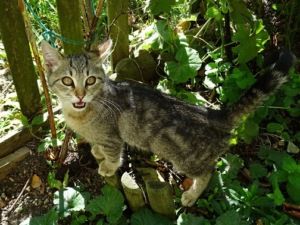News
Nature News in Brief: One in five Danes don’t like cats, study reveals
This article is more than 7 years old.
In other stories, bluefin tuna excite researchers, racoon dog found on Bornholm, and trees and plants are confused by the good weather

It’s a jungle out there and some times it’s best to keep out of sight of the neighbours (photo: pxhere)
A new study carried out by the University of Copenhagen’s natural and biological science faculty has confirmed earlier findings that the common or garden moggy can be a cause of conflicts between neighbours.
The figures reveal that 21 percent of the population actively do not like cats, 14 percent are indifferent to them and 65 percent like them.
What’s new, pussycat?
One of the main bones of contention is the roaming cat.
“On the one hand we have the cat owner who wants to give the animal the possibility of following its natural instincts outdoors, and on the other we have the neighbour who doesn’t want the cat in the garden or cellar,” said Professor Peter Sandøe, the head of the research team.
The study revealed that 72 percent of all Danish cat owners allow their cats to roam freely outdoors, while 60 percent of them don’t see any problem with it.
Look what the cat’s tagged in
Although cats can damage furniture and fittings and leave their calling cards in other people’s flower beds, contrary to popular belief they are not responsible for any major depletion of birds and wildlife.
There have been cats in Denmark for so long that other creatures have managed to adapt their behaviour accordingly, the study suggests.
Bluefin tuna in Danish waters a boon to researchers
For the last two weeks, researchers and fisherman have been co-operating on trying to measure, tag and take samples from as many bluefin tuna as possible off Skagen, reports DR Nyheder. The fish, which typically weigh 300 kilos and can be 2.5 metres long, has recently been spotted in Danish waters again after an absence of several decades. “When the tuna were here two generations ago, we didn’t have the capability we have now to research it,” said Professor Kim Aarestrup from DTU Aqua. “We would like to know more about why it is here and also whether it will stay and in what quantities,” he added. The bluefin tuna is very sought-after commercially and is especially prized on the Japanese market for sushi, but as yet it is not possible to catch it locally because it is protected by quotas and Denmark does not have any quota allocations. So far, tuna have been spotted in the Skagerrak and Kattegat.
Racoon dog on Bornholm
DNA found in traces of excrement on Bornholm indicates that the racoon dog has managed to reach the island, DR Nyheder reports. Racoon dogs originated in east Asia and are regarded as an invasive species because they are effective predators who can pose a threat to birds and small mammals. They can also carry rabies. A number of them have been causing problems in Jutland and probably stemmed from tame animals that escaped or animals coming from Germany. It is not known how the animals reached Bornholm. Although they are strong swimmers, it is more likely they stowed away on a ferry for Poland or Germany.
A second spring for some plants and trees
The unusually hot and dry summer weather this year caused a number of problems for grass, plants and trees. Brown fields and lawns were a common sight around the country. Now, leaves are sprouting again in some parts of Denmark as if it was spring again, reports TV2 Nyheder. “It’s quite normal for nature to start again if, for example, there has been a wildfire or if you trim a bush. It’s the same mechanism we are seeing here after a long and extreme drought,” said Trine Sørensen from the Naturstyrelsen nature authority. Although it might look odd, there are no significant negative consequences for the trees and plants because they form sufficient numbers of buds so that there will still be enough when the real spring comes along.










































